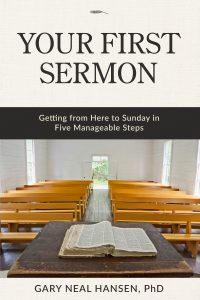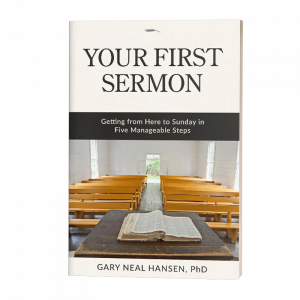 Dear ______:
Dear ______:
Wow! You get to preach a sermon to a real congregation in a real worship service for the first time — and before you start your field education. That’s great. I’m glad your pastor invited you.
In my last letter I said that this would be easier than preaching in the local rescue mission, and that seems to have surprised you — or maybe it is just that the prospect of preaching in a Sunday service feels more serious, and more threatening than preaching in your class.
But it can feel intimidating, climbing up the steps to a pulpit, knowing all eyes are on you. (Be glad it is not one of those old-fashioned ones, “six feet above contradiction” as they used to say.)
I know one woman who was about to preach her first sermon. She was nervous. The pastor came to give her what she hoped would be a pep talk. Instead he quoted Aragorn from the movie version of Lord of the Rings.
Aragorn: Are you frightened?
Frodo: Yes.
Aragorn: Not nearly frightened enough.
Preaching a sermon may not be quite as dramatic as carrying a magical ring for destruction in Mordor, but it is very serious business. In the Reformed tradition preaching the Word of God is considered to be the word of God.

Whether you take yourself that seriously as a preacher or not, people in the congregation will take you very seriously indeed. Some of them may make life-changing decisions based on how you invite them into what God said long ago and what God is saying today.
(The process is also full of surprises. Whether because of God’s ability to speak despite human words, or because of the, shall we say “quirks” of the listeners, you will find that sometimes people thank you after the sermon for saying things which you in fact never said.)
If you find yourself trembling, sweating, sleepless, or even vomiting out of anxiety as you prepare to preach to that congregation, I recommend that you simplify your task: remember that it has just two parts.
1. Explain the text you read to them.
Whether the congregation uses the lectionary, reads through a book of the Bible chapter by chapter, or lets the preacher pick the text, your job remains clear: When you preach a sermon, you need to take that text and bring them deeper into it.
You may not be a great Bible scholar. But you have had some graduate study in the area, and we all expect you to spend part of the week digging into that text.
- Help us hear it in context.
- Help us see what is odd or funny.
- Help us see where it is more confusing than we might have expected.
- Help us figure out what the author meant.
Help us understand the passage better. That’s all we ask.
I wish that I’d only heard a few sermons that failed at this basic level. Some explain some other text that they didn’t actually read. Some waffle about on the text but never shed any actual light on it.
And, sadly, some preachers never mention the text at all. (I am not kidding.)
Don’t be that preacher.
2. Talk about life as we know it.
You also need to relate the text to our lives. That’s the second part of a preacher’s job.
That probably seems pretty basic. It is. And I wish I’d heard fewer sermons fail on this point too.
Some preachers just give a Bible study — a journey through textual problems and insights gleaned from the best scholarship they have on their shelves. That leaves us asking the obvious question: Why does it matter?
Some preachers try to relate the text to life but they miss the point at a subtler level: The life they describe is not OUR life.
- They apply the text to theoretical believers and theoretical non-believers.
- They apply the text’s wisdom to problems that we just don’t have.
- They apply the text’s judgment to sins we frankly don’t commit.
This leaves us safely going about our own lives, without any troubling impact from God’s Word.
You don’t want to be that preacher either. To avoid it you need to become a student not only of the Bible but of the actual people in the congregation. Only when you know what they think, and feel, and struggle with can you help them listen to the Word of God.
Preach a Sermon this Sunday
Here’s a little secret: Doing these two things isn’t rocket science. It takes your full attention, but you really can do it.
Here’s another little secret: This two-point agenda pretty well describes the practice of two of the most influential preachers who ever lived — John Chrysostom and John Calvin. Take a peak at some of their sermons some time. They are excellent role models.
Blessings,
Gary
++++++++++++
Hey, if you want more help than this blog post provides, I’ve written a short, practical, step-by-step guide to help you through the process. Click here or on the image to get Your First Sermon: Getting from Here to Sunday in Five manageable Steps on Amazon.

This post contains affiliate links.

Gary: Thank you! Very good. Jim
You are welcome, Jim! Nice to hear from you.
This is a helpful and sobering post as I continue to struggle with preaching. Careful attention to Scripture and the congregation are indeed both crucial. Sermons are very much context-driven.
I always liked Rob Hoch’s advice at UD as well. He always stressed that a sermon should address two questions: What is God doing for us? How should be respond?
I also like the advice I heard recently from a friend from a Pentecostalist background: How does this sermon lead people into a relationship with Jesus or help them deepen their relationship with Jesus?
Both of these help me think about the question you raised after exegesis is completed: So what?
Thanks Gary — I missed hearing from you during my blogging hiatus.
Those are both good bits of discernment advice. However I favor the simpler (though not easy) tasks of my own two part homiletical agenda for a couple reasons.
If one could count on knowing what God is doing, whether for us, in us, or through us, it would be great to preach on it as Rob suggests. And one should always be prayerfully listening and looking for hints about these things. But one does not always know. One can often only speak of such things in retrospect, sometimes long after — and sometimes never, actually. It is the regular work of digging in Scripture and listening to the people with care that is likely to reveal the hints of what God is doing. But there are times, in individual and corporate Christian living, where it just isn’t clear what God is doing. Many of the great mystics, those known for particular intimacy with God, write in dermis of “deserts” and “dark nights.” Look at Mother Theresa — years of doubt and emptiness, but God was certainly at work in and through her. It was her faithfulness that mattered, not her clarity.
And your Pentecostal friend’s advice? It works best if you broaden the terms of the target from personal relationship with Jesus and aim for Christian maturity. If your sermons discussed only one’s relationship with Jesus, and stuck to that explicitly and relentlessly, you would not be able to say all you need to say about a good deal of Scripture. Or maybe I should say good preaching needs to deal faithfully with texts that are more about doctrine than about spiritual life sometimes. And all the other kinds of texts. Diving into the rich variety of the Bible all is part of equipping people for maturity, but not always directly about relationship with Jesus.